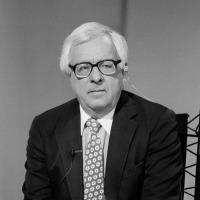BROOKE GLADSTONE: Every science fiction geek has to start somewhere. For me and for many, many others, possibly even Stephen Colbert, it started with Ray Bradbury, who died this week at 91.
[“THE COLBERT REPORT” CLIP]:
STEPHEN COLBERT: Ray Bradbury’s work introduced us to fantastic far-off worlds and bizarre futures, yet in his work nothing was stranger than what he found hidden in the human mind. So tonight, I want to honor his memory in a way I’m sure he would appreciate, by burning this copy of Fahrenheit 451.
[AUDIENCE LAUGHTER/CLAPPING]
[END CLIP]
BROOKE GLADSTONE: Science fiction, once a denigrated genre, is denigrated no more by knowledgeable readers, and it’s so wide-ranging it hardly qualifies as a genre, especially as rendered by Bradbury. His Dandelion Wine was an elegy, his Martian Chronicles an allegory. His most famous book, Fahrenheit 451, was that bluntest of literary objects, a cautionary tale about a future where firemen burn books.
[“FAHRENHEIT 451” CLIP]:
JULIE CHRISTIE AS CLARISSE: Tell me, why do you burn books?
OSKAR WERNER AS GUY MONTAG: Well, it's a job like any other, good work with lots of variety. Monday, we burn Miller; Tuesday, Tolstoy; Wednesday, Walt Whitman; Friday, Faulkner; and Saturday and Sunday, Schopenhauer and Sartre.
[END CLIP]
BROOKE GLADSTONE: Bradbury long contended in interviews that Fahrenheit 451 never was about government censorship. His fear was that TV and even radio would kill books, shrink our attention span, damage our relationships.
In the book, fireman Guy Montag describes his wife Mildred stretched out on the bed, quote “Like a body displayed on the lid of the tomb, her eyes fixed in the ceiling by invisible threads of steel, immovable, and in her ears the little seashells, the thimble radios tamped tight, and an electronic ocean of sound, of music and talk, and music and talk coming in, coming in on the shore of her unsleeping mind. Every night the waves came in and bore her off on their great tides of sound floating her wide-eyed toward morning.”
And yet, despite Bradbury’s claim that he feared people and machines more than the government when it came to the real or metaphorical burning of books, he said in many interviews that state censorship was very much on his mind.
RAY BRADBURY: When I was 15 years old Hitler burned books in the streets of Berlin, and it, it terrified me because I was a librarian, and he was touching my life. All those great plays, all that great poetry, all those wonderful essays, all those great philosophers. So it became very personal.
BROOKE GLADSTONE: Perhaps Bradbury’s censorship worries receded, as our devices proliferated, because he insisted that that was the real problem. As he told the L.A. Times in 2010, “We have too many cellphones, we’ve got too many Internets. We have to get rid of those machines.” In 2009 he told Yahoo!, who wanted to make an e-Book of Fahrenheit 451 to, quote “Go to hell.”
It reminds me of what another great science fiction writer, Douglas Adams, once observed. He said, “Anything that is in the world when you were born is normal and ordinary and is just a natural part of the way the world works. Anything invented after you're 35 is against the natural order of things.” Bradbury’s great talent was to project the human mind and heart into a strange future and imagine how they would fare.
For Bradbury, it seemed technology defined the strange future. He used to say “I don’t try to describe the future, I try to prevent it.” A failure of the imagination? Well, he was only human. In the end, he had to submit to an e-book and to the competing interpretations of Fahrenheit 451. But those were small concessions in a life so well lived and so well loved, even as he projected himself into a future without Ray Bradbury.
RAY BRADBURY: Here lies Ray Bradbury, who loved life completely.
BROOKE GLADSTONE: What am I saying? He’ll be there in the books he feared were dying. They’re not.
[MUSIC UP AND UNDER]:
RAY BRADBURY: We are all the sons and the daughters of time, so I thank the universe for making life on earth and allowing me to come alive here.
[ELTON JOHN SINGING “ROCKET MAN”/UP AND UNDER]
BROOKE GLADSTONE: “Rocket Man,” by Elton John and Bernie Taupin, was apparently inspired by Bradbury’s short story, “The Rocket Man.” Ray Bradbury died this week at 91.
